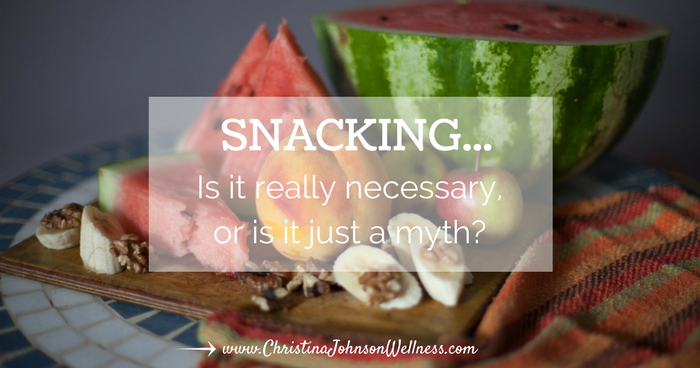For many years, the message I heard from health experts, diet books, and weight loss programs was that I needed to eat 3 meals a day with at least 1 or 2 snacks in between.
So I followed that advice. I ate breakfast, a mid-morning snack, lunch, an afternoon snack, and then finally dinner. I even included an after dinner snack on occasion. What ended up happening, though, is that I became consumed with food.
Because let’s be honest…it takes a lot of time to plan, prepare, and shop for 3 meals a day plus snacks! As a result, I was thinking about food all day long.
Eventually, I began to wonder…is it really necessary to eat so often throughout the day?
Is Snacking Necessary?
While I don’t have a definitive answer to this question, I want to share a few thoughts with you to encourage you figure out what actually works best for you. Here are a few factors I personally found interesting to consider:
Historical:
If you think about how Americans ate prior to the last 40 years or so, you realize that snacking multiple times throughout the day is a relatively new phenomenon. The norm used to be to eat 3 meals a day with an occasional dessert after dinner. Just ask someone from an older generation to share with you how often they ate growing up.
Then, as I looked back over the past couple hundred years, I realized that food was not as readily available and in such convenient, packaged forms as it is now. I had to ask myself, have our bodies really been designed to eat every couple of hours?
Physiological:
Next, let’s think about what happens in our body when we eat. The food we eat gets broken down into glucose so that our body can use it for energy. After we use up that glucose (as well as any glucose that is stored in our muscles and liver), guess what happens next…our body begins to use stored fat as fuel for energy. And this is exactly what we want to have happen if we are trying to lose weight! [1]
This suggests that if we space out our meals and reduce snacking, we will give our body more of an opportunity to burn stored fat. And that sounds like a win to me!
Grazing:
Finally, when we give ourselves permission to snack throughout the day, we give ourselves permission to eat whether or not we are hungry. As a result, we often end up “snacking” or “grazing” whether or not we are actually hungry. We might snack out of habit, boredom, or simply because there is food in front of us.
While I don’t believe in the necessity of calorie counting, if we eat when we are not physically hungry, then we are consuming calories that our body does not actually need for energy. And I think we both know that this will not help us lose weight!
Should You Quit Snacking?
One of the reasons that diets don’t work is because they take a one-size-fits-all approach. I don’t want to add to this problem by saying that everyone needs to quit snacking immediately or that we all need to snack multiple times throughout the day.
Let’s assume for a moment, though, that you are currently a snacker. If you are at a healthy weight, have lots of energy, can think clearly, and are an overall healthy person, then why change what’s working for you? If it’s not broke, don’t fix it!
On the other hand, if you are struggling with your weight and have energy crashes throughout the day, then you might want to experiment with trying something different and cutting back on snacking.
Here’s the good news…it’s just an experiment! You can try it for a couple weeks and see if it makes a difference in how you look and feel.
Tips to Help You Quit Snacking
After thinking through the factors listed above, I decided it was worth it to me to experiment with eating less often throughout the day. If you decide to do the same, here are a few tips to keep in mind:
-
- Make sure that you eat enough food at each of your meals so that you feel full and satisfied for at least 3 hours.
-
- Cutting back on snacking is not necessarily about restricting your calories. Instead, it gives your body a break in between meals, and it helps you cut back on mindless eating when you are not truly hungry.
-
- Always listen to your body. If you are physically hungry between meals and it’s going to be awhile until your next meal, then have a snack. The goal is to be flexible and to eat only when you are actually hungry.
- Always listen to your body. If you are physically hungry between meals and it’s going to be awhile until your next meal, then have a snack. The goal is to be flexible and to eat only when you are actually hungry.
-
- Address your sugar cravings. Often times we want to snack because we’re craving sugar. Try dealing with your sugar cravings by eating more of the foods listed in my FREE guide, “Top 10 Foods that Make It Easier to Lose Weight & Get Rid of Cravings.” Click here to download the guide.
-
- Be sure that your blood sugar levels feel stable. If they are not, then you may feel weak, light headed, tired, or “hangry” if you wait too long to eat. If you don’t feel good, then you probably want to eat a healthy snack.
-
- Do what works for you. Be willing to experiment with how often you eat, and then decide what helps you to look and feel your best.
So is snacking really necessary? I hope you now feel empowered to figure out the answer to this question for yourself! Please share in the comments any insights you have.
Sources
[1] Virgin, JJ. Sugar Impact Diet. New York: Grand Central Life & Style, 2014.



